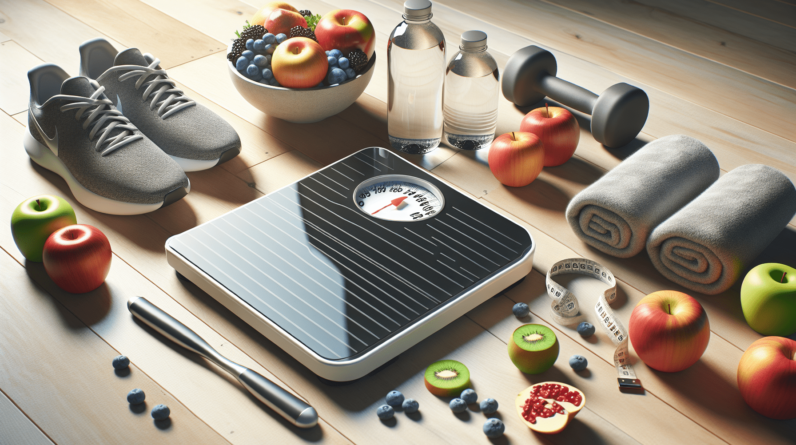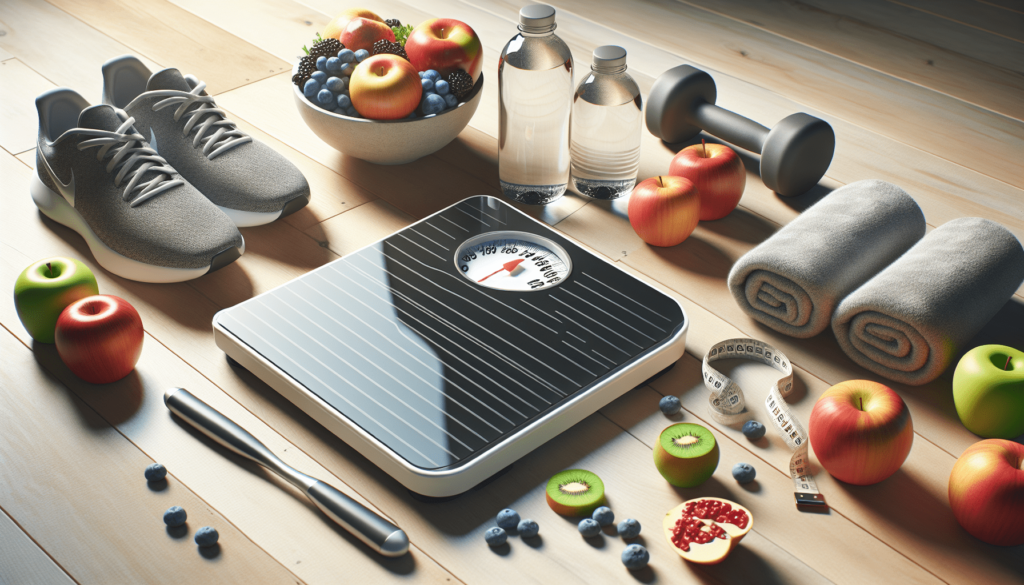
Welcome to “The Top Weight Loss Secrets That Actually Work!” In this guide, you’ll uncover practical and proven tips to help you achieve your weight loss goals. You’ll learn about effective strategies, from smart dietary choices to simple lifestyle changes, that can make a real difference. Say goodbye to fads and hello to results as you embark on a journey to a healthier, happier you. Have you ever wondered why weight loss feels like an unattainable dream sometimes? You’re not alone. Many people struggle with shedding those extra pounds, even after trying numerous diets and workout routines. If you’ve found yourself in this predicament, it’s time to approach weight loss with strategies that actually work. Let’s dive into “The Top Weight Loss Secrets That Actually Work” and explore methods that will help you achieve your goals.

Discover The Top Weight Loss Secrets
Setting Realistic Goals
Setting realistic goals is the bedrock of any successful weight loss journey. Remember, the objective isn’t to lose weight as quickly as possible, but to create sustainable habits.
Understand Your Starting Point
Before you embark on your weight loss journey, take some time to assess your current lifestyle and habits. This self-awareness will make it easier to plan realistic goals.
SMART Goals
Make sure your goals are Specific, Measurable, Achievable, Relevant, and Time-bound. This framework helps keep you focused and motivated. For example, rather than saying “I want to lose weight,” aim for “I want to lose 1-2 pounds per week over the next three months.”
Balanced Diet
Having a balanced diet is crucial for weight loss. It’s not just about cutting calories; it’s about ensuring your body gets the nutrients it needs.
Quality Over Quantity
Choose nutrient-dense foods over empty-calorie options. Foods rich in vitamins, minerals, fiber, and lean protein will fill you up and sustain your energy levels.
Portion Control
Controlling your portion sizes can help you manage your calorie intake effectively. Use smaller plates, measure your food, and be mindful of serving sizes.
Macronutrient Ratios
Here’s a simplified breakdown:
| Macronutrient | Purpose | Sources |
|---|---|---|
| Carbohydrates | Provide quick energy | Fruits, Vegetables, Whole grains |
| Proteins | Build and repair tissues | Lean meats, Beans, Tofu, Nuts |
| Fats | Support cell function | Avocados, Nuts, Seeds, Olive oil |
Balancing these macronutrients can keep you fuller longer and more energetic throughout the day.
Physical Activity
Exercise is a cornerstone of weight loss, but it’s not just about hitting the gym every day. Finding consistent, enjoyable activities can make all the difference.
Cardio vs Strength Training
Both cardio and strength training are essential. Cardio burns calories, while strength training builds muscle mass, which can increase your resting metabolic rate. Aim for a mix of both.
Consistency Over Intensity
You don’t have to do high-intensity workouts every day to see results. Consistency is more important. Find exercises you enjoy—whether it’s walking, swimming, or dancing—and stick with them.
Include Movement in Daily Routine
Small adjustments can add up. Use the stairs, walk during breaks, or do short exercise routines at home. These efforts contribute significantly to your overall activity level.
Effective Weight Loss Strategies
Mindful Eating
Mindful eating involves paying full attention to your food, which helps you enjoy your meals and recognize when you’re full.
Focus on Hunger Cues
Listen to your body’s hunger and fullness signals. Eating when you’re truly hungry and stopping when you’re comfortably full can prevent overeating.
Avoid Distractions
Turn off the TV, put away your phone, and focus on your meal. Eating without distractions can enhance your eating experience and help you understand your body’s needs better.
Chew Thoroughly
Chewing food slowly and thoroughly can improve digestion and give your brain enough time to signal that you’re full. Try to spend at least 20 minutes on each meal.
Hydration
Staying hydrated is often overlooked but vital in the weight loss journey. Sometimes, your body can confuse thirst with hunger.
Drink Before Meals
Drinking a glass of water before meals can help you eat less by making you feel fuller.
Daily Water Intake
Aim for at least 8 cups of water a day. Adjust based on your activity level—you might need more if you’re active.
Include Hydrating Foods
Fruits and vegetables like watermelon, cucumbers, and oranges are high in water content and can help keep you hydrated.
Sleep
Quality sleep is critical for weight loss. Lack of sleep can affect hormones that regulate hunger and appetite, making you more likely to overeat.
Create a Sleep Routine
Establish a regular sleep schedule by going to bed and waking up at the same times every day, even on weekends.
Improve Sleep Quality
Avoid caffeine and electronic screens before bed. Create a relaxing bedtime routine to improve sleep quality and duration.
Manage Stress
Stress can negatively impact your sleep and overall health. Incorporate relaxation techniques such as meditation or yoga into your routine.

Avoid Fad Diets
Fad diets promise rapid weight loss but are often unsustainable and can be detrimental to your health.
Short-Term vs Long-Term
While fad diets may offer quick results, they often lack essential nutrients and aren’t maintainable. Focus on long-term lifestyle changes instead.
Balanced Approach
Adopt a balanced approach to eating. Include a variety of foods to ensure you’re getting a range of nutrients.
Listen to Your Body
Your body knows best. If a diet makes you feel sick, overly tired, or miserable, it’s probably not right for you.
Accountability and Support
Having a support system can keep you motivated and accountable.
Find a Buddy
Partnering with a friend can make your weight loss journey more enjoyable and help you stay committed.
Join a Community
Online forums, social media groups, or local fitness classes offer communities where you can share experiences and receive support.
Professional Guidance
Consider seeking advice from a dietitian or a personal trainer. They can offer personalized guidance tailored to your needs.
Address Emotional Eating
Emotional eating can sabotage your weight loss efforts. Recognizing and addressing it is essential.
Identify Triggers
Keep a food diary to note when, where, and why you eat. Identify patterns and triggers that lead to emotional eating.
Find Alternatives
When you identify emotional eating triggers, find alternative coping mechanisms. This could be talking to a friend, going for a walk, or engaging in a hobby.
Professional Help
If emotional eating is a significant issue, seeking help from a mental health professional might be beneficial.
Track Progress
Monitoring your progress can provide motivation and indicate areas that need improvement.
Keep a Journal
Document what you eat, your exercise, and how you feel. This journal helps identify successful strategies and areas that need adjustment.
Regular Check-ins
Regularly weigh yourself and take body measurements. Don’t get discouraged by small fluctuations; focus on long-term trends.
Use Technology
Apps and gadgets can help track your activity, food intake, and progress. Choose tools that are user-friendly and suit your lifestyle.
Flexibility and Adaptability
Rigid plans can set you up for failure. Be adaptable and willing to make changes as needed.
Adjust as You Go
If something isn’t working, don’t be afraid to change it. Flexibility is key to finding what works best for you.
Allow Indulgences
Completely denying yourself treats can lead to binge eating. Allow occasional indulgences without guilt.
Celebrate Small Wins
Every step forward is progress. Celebrate your achievements, no matter how small, to stay motivated.
Medical Factors
Sometimes, underlying medical issues can impede weight loss.
Get a Check-Up
See your doctor to rule out medical conditions that might be affecting your weight, such as thyroid problems or hormonal imbalances.
Medication Review
Some medications can influence weight gain or loss. Discuss your prescriptions with your healthcare provider to understand their impact.
Follow Medical Advice
If prescribed, follow your doctor’s recommendations, whether it’s medication or a specialized diet, to address underlying health issues.
Nutritional Support
Certain supplements can aid in your weight loss journey. However, they should not replace a balanced diet.
Essential Vitamins and Minerals
Ensure you’re getting essential nutrients like Vitamin D, B12, Iron, and Omega-3 fatty acids, which can support overall health and weight loss.
Consult a Professional
Always consult a healthcare provider before starting supplements to ensure they are appropriate for you and won’t interfere with any medications.
Natural Sources
Whenever possible, get your nutrients from whole foods. Supplements should be just that—supplementary.
Consistency is Key
Consistency is the most important factor in achieving long-term weight loss.
Build Habits
Focus on building healthy habits rather than chasing immediate results. Consistent, small changes add up over time.
Stay Positive
Weight loss is a journey with ups and downs. Stay positive and don’t let setbacks derail your progress.
Long-Term Perspective
Remember that you’re aiming for health and wellness, not just a number on the scale. Keep a long-term perspective to stay motivated.
In conclusion, weight loss is not a one-size-fits-all journey. It requires a combination of realistic goal-setting, balanced diet, regular physical activity, and other lifestyle changes. By following these top weight loss secrets that actually work, you’ll be well on your way to achieving your goals. Stay committed, be flexible, and most importantly, enjoy the process.



